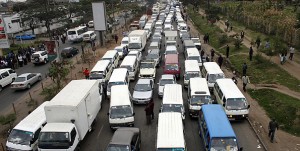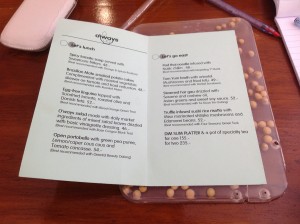Prisoner’s Dilemma
The fun thing about Economics (yes there are actually a couple of things fun about it) is that you can find practical applications to it in everyday life. And no I am not talking about Supply and Demand; Economics is so much more than that. In this particular scenario I’m talking about Game Theory (the subject matter whose first course is incredibly easy and everyone passes with flying colours, following which anyone silly enough to pursue it at a higher level comes to regret their very existence). I see it every day in Nairobi traffic. Let me explain…
Each driver has a choice at each intersection or patch of road to either follow the rules and stay on your lane, or shirk and overlap in order to beat the traffic. If everyone obeys the rules (which based on our pathetic driving school curriculum, no one really knows) we’ll at most take 5 minutes to pass. But yet if even one decides to cheat, they cut their own waiting time to 1 minute, and increases everyone else’s time to 9 minutes. Not wanting to be left alone in the traffic, the dominant strategy for all is to renege the rules and drive on the opposite side. The result of all this is that everyone spends 15 minutes stuck on the same road, frustrated, late and bitter.
Sadly, the choice to disobey the rules is actually the logical decision to make, when only considering yourself, however it results in the worst case scenario for all. If we just took some time to think of the greater good, that is colluding, we’d all be better off. Another way we could have the rules being followed would be if we in some way could know who the other person driving was and we could expect to see them at the same junction every day for the rest of our lives. Then the game would become an indefinitely repeated one which would make each driver fear that any degenerate action on their side would be retaliated against on the next day. Equally too, if every instance of overlapping could be caught and punished, then the cost to each driver for going against the rules would be too high and we’d all follow the rules. But none of this is possible… at least not for now.
Similarly, restaurants and consumers play a comparable game. When restaurants are deciding on what wines to list, they have an option to go cheap and put high mark ups, or go more expensive and put more reasonable mark ups. The consumers similarly can either buy the cheapest wines on the list (if at all) or go for the higher priced ones.
For a restaurant going cheap and having customers buy expensive, they would have an absolute win at the expense of the clients. Alternatively, restaurants going more expensive and clients going cheap, would mean restaurants sitting on rather expensive stock, while clients had a “grand time”!
Cheap therefore becomes the dominant strategy for all. As a result, restaurants go for creaming it with each individual sale, and rather not quantity of sales, which reads great on margin spreadsheets. Consumers, knowing just how cheap they can buy the exact same wine at a Supermarket for, opt to go either for the cheapest or rather drink an alternative beverage altogether. Which “confirms” to restaurants their choice of cheap was valid, and thus wines by the glass that are already insipid, remain open for weeks and taste even worse, if you can believe it.
Picture credit to www.techarena.co.ke.




Great blog Tom! 🙂 I really enjoyed the use of Economics to explain restaurants and consumers. Great to see that you’re still on point with your Economics theory.
I thoroughly enjoyed this! Insightful. 🙂